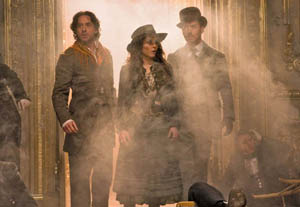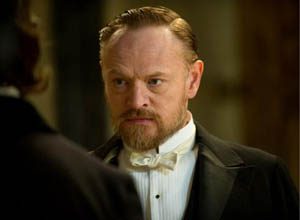|
A century-plus of popularity does amazing and interesting things to litarary icons. Ask any random stranger to name Sherlock Holmes arch-nemesis, and odds are the individual will easily produce the name of Professor Moriarty. The evil-doer's legend looms so large in our collective understanding of the Holmes mythos that it can be surprising to learn that Moriarty figured in only one Holmes story, a short story no less, wherein he shared but a single scene with the renowned detective. Hollywood screenwriters and subsequent authors have been embellishing the character's pedigree ever since, but probably never quite so effectively as here. 
The problem, as it were, with Arthur Conan Doyle's The Final Problem, beyond the fact that the title was eventually rendered untrue, is that it is an incredibly slight story in terms of plot. There is no mystery to solve, no mind-blowing feats of deduction present. It exists more than anything as a final statement on the moral character of Holmes. The facts of Moriarty's cunning nature and elaborate schemes are related in the past tense; Holmes merely imparts these truisms as I have just done, without elaboration. All of the die-hard purists out there should consider the fact that the original short story wouldn't make for much of a motion picture if adapted straight. Yes, the second installment of Guy Ritchie's modern take has, as expected, filled the story with fistfights and cannon fire, explosions and humor. Yet Ritchie and his screenwriters appear to intend no disrespect to The Final Problem, which they quote and reference extensively. What A Game of Shadows does is to fill in the blanks for us, showing these two great titans of intellect and strategy plying their wits against one another. It's not enough to be told that Moriarty is a dangerous criminal mastermind; we need to see for ourselves, and see it we do. Even before the title has appeared, it's obvious that the film isn't playing softball with us. Anyone deserving of the moniker "the Napolean of crime" must pose a real threat, not a purely theoretical one. While Ritchie's films in general tend towards an overall whimsical tone, he's not afraid to take things to a darker place when the story requires it. Seen as a man who might well plunge the world into war for personal gain, Moriarty is a figure against whom our heroes cannot appear to be invincible. Holmes is a man whose mind works with incredible speed, as illustrated in numerous instances throughout. The audience needs to keep a close second place as the labyrinthine plot flashes past; while intended as an exciting crowd-pleaser, Game of Shadows is not a film aimed at the slow-witted or inattentive. Despite constant assertions and complaints to the contrary, there's nothing inherent about action-adventure films that necessitate that the viewers must, as it is so cynically put, "turn off their brains." More intrinsically important than the action is the characters. Watson is our way in, the normal man who in truth is probably smarter than most of us, but whose wants and needs in life are relatable. Holmes is forever the outsider by virtue of his savant-like ability to cull patterns out of the chaos, a man who jokes, half bitterly, that his disinterest in the everyday trappings of life, such as romance, will leave him to die alone. Yet there's a strong undercurrent of decency hiding just below his insufferability-more than once he professes that he'd willingly die to stop his rival. He may feel little kinship with humanity, but does not regard them as lessers. By contrast, Moriarty is seen as a cultured man of high repute, a refined and self-possessed man with none of Holmes's manic fits or social disfunction, but with an uncanny look in his eyes and his smile that betray something rotten inside, a putrefying ugliness disguised only by stature and superficial conformity to social norms. 
In terms of the action, it must be said, Guy Ritchie is at the top of the game in his shooting and editing. High-energy sequences are frenetic yet exacting and precise, a perfect evocation of Holmes's personality and methods. While many directors have taken the approach of utilizing extreme slow-motion abruptly interrupting high-speed events, Ritchie was one of its first practitioners, and he never uses it randomly-for that, see Zack Snyder's 300, which overuses the technique more than any cinematic technique has likely been overused before. Here, it's used purposely, to show the startling speed with which Holmes deduces his plans of action or to express those moments of shock, such as often described regarding the moments before a car crash, when time seems to slow to a crawl. But more importantly, he knows the role of action here, and where it's best relegated. It is, after all, more deeply satisfying to see a hero best his opponent via his intellect and wits than to see him win via a mere display of force, no matter how well-photographed it is. If there's one complaint I could make, it would be that there's little apparent connection between the events of this film and those of the first, wherein Moriarty masterminded the theft of a prototype radio transmitter. The device doesn't seem to figure anywhere in the plot. I understand the desire not to alienate an audience that may be coming to this film without knowledge of its predecessor, but it would've been nice to have some cursory explanation of how the previous story tied in. I suppose I could also complain that one of Holmes's gags is logically impossible given the timing of certain events, but seeing as how it was one of the most enjoyable moments in the film, in this instance I'll just shut my eyes and pretend I didn't notice. -review by Matt Murray
|
|
||||||||